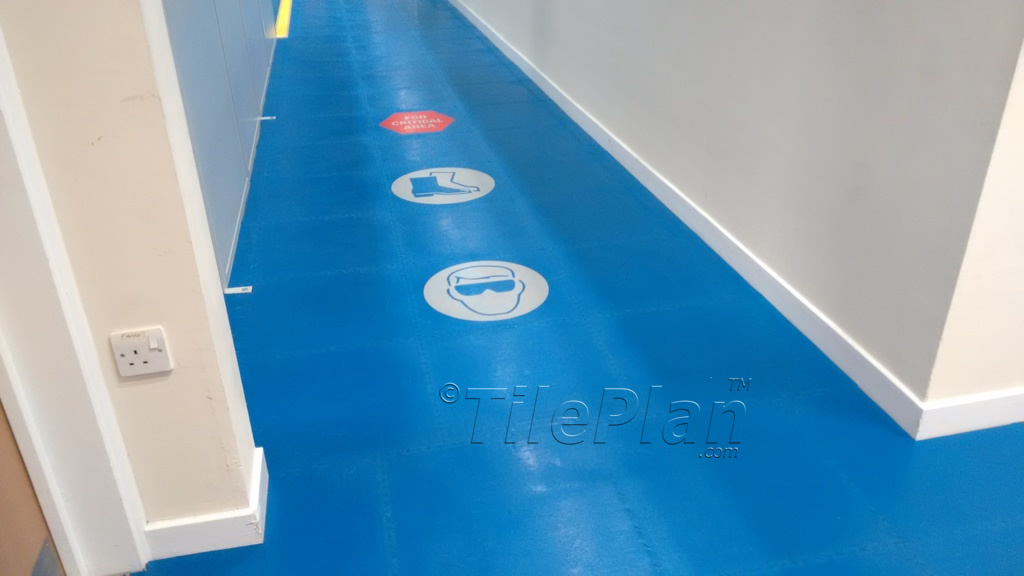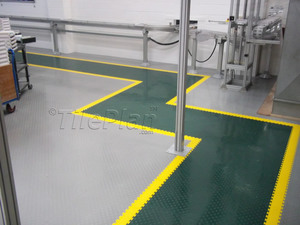

|
Edward Lowton
Editor |


|
| Home> | Premises management/maintenance | >Flooring | >Demand grows for PVC flooring |
Demand grows for PVC flooring
18 February 2022
Trudec tiles, manufactured by Broanmain Plastics, with layouts designed, customised, installed and supported by TilePlans, is responding to growing commercial demand for resilient PVC flooring by increasing production of its interlocking, REACH-compliant, industrial-quality PVC floor tile system.

Used in residential construction, commercial facilities and factories, as well as industrial and automotive settings, hospitals, schools and even gyms, global supplier TilePlans is reporting unprecedented demand for the Trudec flooring system. Most recently a very bespoke request for an all-white flooring for a global yacht manufacturer.
Made from polyvinyl chloride (PVC) by Broanmain Plastics, TilePlans managing director Colin Wilson highlights that safety, hygiene, sustainability and resilience are all critical factors that are driving commercial customers towards resilient PVC floor coverings. He credits the current boom in the PVC tile market to technical injection moulding innovation and corporate aesthetics, which enables customers to personalise an entire floor space. PVC also complies with European REACH regulations for flooring.
More forgiving than traditional ceramic floor tiles and a versatile, longer-lasting alternative to epoxy coatings and floor paints, the interlocking floor tile system can be designed to meet the most stringent health & safety requirements. Wilson comments: “Available in multiple colours and textures, risk managers and commercial designers can clearly specify designated work zones and walkways to meet their COSHH and localised regulatory workspace requirements. Colour zones can also be used to delineate collaborative workspaces and even add sections of bright colour to raise workforce energy levels and increase productivity.”
Advances in injection moulding and waterjet cutting technologies deliver visual brand aesthetics, workforce notices and clear demarcation lines. As a result of the interlocking tiles, these can be swapped out, moved and interchanged without having to replace an entire floor.
Sustainable and maintainable
Development of green buildings is likely to serve as one of the primary growth drivers of the commercial flooring materials market in the next eight years according to a recent report by Grand View Research. Valued at US$27.06 billion in 2016, the resilient flooring market – comprising vinyl, rubber, PVC and linoleum - is forecast to experience some of the strongest growth indicates the report.
“Sustainability is clearly a top consideration in commercial floor coverings. PVC not only offers greater durability than paint or thin vinyl floor tiles for heavy foothold areas, being able to stagger the interlock between tiles also means that our customised flooring systems are designed to withstand constant movement of heavy roiling loads by forklift trucks and other industrial vehicles,” explains Wilson. Should a high traffic area incur significant wear and tear, individual tiles can be swapped out and replaced with minimal investment and disruption to business, he points out.
“There are also eco-friendly options using reground and bio-based plastic materials within the PVC mix that doesn’t compromise the robustness or durability of the tiles’ performance,” says Broanmain’s production manager Thomas Catinat. Additionally, when the flooring reaches the end of its lifespan, the tiles are fully recyclable.
For commercial spaces that are prone to spills, interlocking PVC tiles are also easier to clean and maintain. Broanmain only uses the highest quality PVC for the Trudec flooring system, which means the tiles are resistant to staining from oils and industrial chemicals, as well as being flame retardant.
Comfort and reducing the impact of sound and vibrations in industrial settings is another important factor TilePlans’ customers are eager to address. Wilson explains: “In recent years there’s been a real focus on improving workforce welfare. In large open spaces especially, sound reverberates. This has proven to be a distraction and affects productivity. PVC flooring can absorb some of this sound and mitigate many of the acoustic challenges caused by machinery that are prevalent in hard floor environments like factories.”
Working collaboratively with new manufacturing and moulding partner Broanmain Plastics, TilePlans anticipates seeing greater saturation of PVC tiles in the global resilient floor market. “With customers increasingly examining the lifecycle cost of their commercial flooring, long terms value is very much on their radar,” adds Colin Wilson.
Recently, the company won a contract to fit out the EMEA Tupperware factory in Greece. Eager to convey a more professional image, an oilfield company in Kazakhstan, Denholm Valvecare also replaced ceramic tiles in its machine shop with interlocking PVC tiles. TilePlans is currently in discussion with Broanmain to design and make an all-white vinyl tile flooring to fill a 200 square metre space.
Broanmain operations director Jo Davis comments: “We recently added 110, 220, 330 and 550-tonne injection moulding machines to our fleet of injection moulding machinery, which has given us the increased capacity, tooling and automation to ramp up production. This agility enables us to react and flex to orders and deliver greater customisation.
“As TilePlans will testify, the quality of industrial flooring conveys more than just a professional image. A well-designed layout with clear demarcation of workspaces can make operations more productive when space is at a premium. We are delighted to be collaborating with TilePlans as popularity for PVC continues to gain traction.”


















